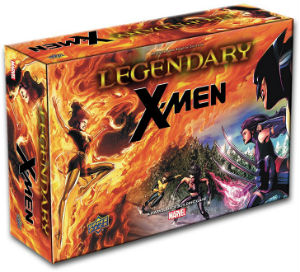



play board games
Board game reviews, strategy tips & session reports
Legendary X-Men Expansion Review
 Stats:
Stats:
No. of players: 1-5
Amount of time to play: 45-60 min
Age requirements: 14+
Set-up time: 5-10 minutes
X-Men is a big box expansion for Marvel Legendary the Deckbuilding Game. It features heroes and villains from the X-Men comics and adds some new mechanics to the Marvel Legendary series.
Legendary X-Men Rules Description:
New to Marvel Legendary? Read my review and overview of the base game here. The rest of this post will focus on the new characters and mechanics introduced in the X-Men expansion.
There are a handful of new mechanics introduced in this expansion. Some are brand new and a few were released in older sets but are new to me. The masterminds in this expansion are double-sided. One side has an Epic version of the villain. If you breeze through an encounter with a mastermind you can flip him over and see how you do.
If just amping up the mastermind isn’t daunting enough, there are Horror cards you can add to make your fight even harder. A few Schemes require you to use these cards that tend to penalize you or benefit the bad guys.
The bad guys in this expansion are just that, bad. They use human shields from the bystanders pile for protection. In order to attack a villain with a human shield you first must spend attack equal to the villains attack value to rescue one human shield.
Some heroes now have the ability to attack with Piercing Energy. Piercing Energy must meet or beat the victory point value of the villain instead of its attack. These attacks also automatically rescue Human Shields.
Traps have been added to the villain deck. Traps force you to meet a condition by the end of your turn or suffer the consequences.
Some bystanders in this expansion are heroic. When rescued they are added to your deck. And a few of the villains are willing to switch sides. When defeated they too go into your deck.
There are divided hero cards. When you play them you must choose which half of the card you wish to use for that turn.
The X-Gene keyword lets you trigger abilities based on cards in your discard pile.
If a card has the Beserk keyword, you discard the top card of your deck. You gain the discarded card’s attack value for his turn. It does not gain you the card’s recruiting points or Piercing Energy value.
When you play two or more cards with the Lightshow keyword you can use one Lightshow ability from any of those cards.
Like the other Marvel Legendary expansions, X-men adds new characters. The divided hero cards feature Aurora and Northstar, Colossus and Wolverine, and Legion. Psylocke, Banshee, Polaris, Jubilee, Beast, Cannonball, Dazzler, Havok, X-23, Longshot, Phoenix, and Kitty Pryde. The six new Masterminds are Arcade, Dark Phoenix, Mojo, Shadow King, Onslaught and Deathbird.
Quick Review of the Legendary X-Men Expansion:
Let me start by saying I am a big X-Men fan. So I am happy to get more characters from the series to play with and against. The new mechanics make for some fun combinations and this expansion really lets you tailor the difficulty to your liking.
The cards and art in this set are comparable to the other expansions. The rules are concise, well written and have some samples too.
This expansion has lots to like. I mentioned how good it is for customizing your experience above and wanted to expand on that. If you think the game is too easy use an Epic mastermind. Too hard add lots of Piercing Energy. It really lets you tailor the game with just one expansion.
The new characters are fun to use as are the new masterminds and villains. Again there is enough in this set to keep you busy for a long time. The replay value is excellent.
The new mechanics are pretty east to remember and do change things from the base game. Nothing here is earth-shattering but there are enough new elements that this expansion is not just more of the same. I also like that the new mechanics add to the play time.
You might have seen this coming but I think the X-Men Legendary expansion is a must-have. Even more so if you are an X-Men fan. Both it and Dark City are close for the best expansions for this game.
Score and synopsis: (Click here for an explanation of these review categories.)
Strategy 3 out of 6
Luck 4 out of 6
Player Interaction 4 out of 6
Replay Value 5 out of 6
Complexity 3 out of 6
Fun 5 out of 6
Overall 5 out of 6


Leave a Reply